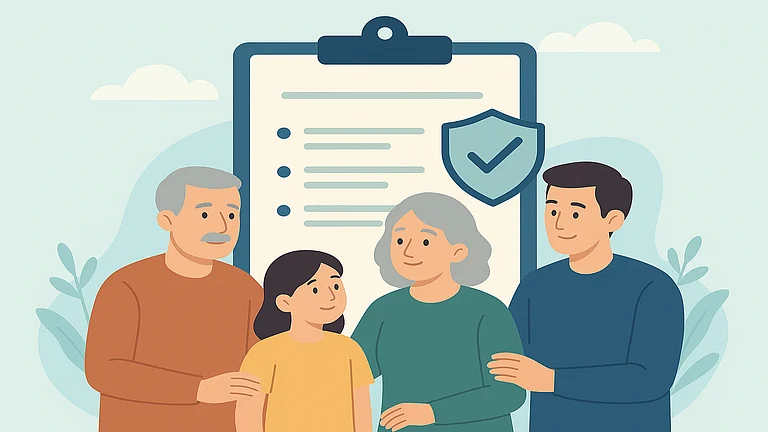The Madurai Bench of the Madras High Court holds that seeking Aadhaar corrections is a fundamental right
The case involved an elderly widow facing issues in transferring her husband's pension account due to discrepancies in her Aadhaar
UIDAI ordered to improve infrastructure for easier access to citizens
Aadhaar Corrections A Fundamental Right, UIDAI Must Ensure Local-Level Access For All Users, Says Madras High Court
The Madurai Bench of Madras High Court has said that correction in Aadhaar is a ‘Fundamental Right’, and the facility should be available locally. The court ruled this in a case pertaining to a 74-year-old widow of an Army pensioner whose pension was stalled due to errors in her Aadhaar card
In a significant ruling, the Madras High Court has linked India’s unique identity system directly with fundamental rights as enshrined in the Constitution of India. The Madurai Bench of the Madras High Court ruled this in a case pertaining to a 74-year-old widow (P. Pushpam) of an Army pensioner whose pension was stalled due to errors in her Aadhaar card.
Justice G.R. Swaminathan held that the right to seek alteration in Aadhaar information is a fundamental right of the citizens.
He said: “When the right to receive the benefits is a fundamental right and Aadhaar Card is a mandatory vehicle through which the benefit can be received, the cardholder has the concomitant fundamental right to seek alteration of the demographic information in the card.”
The court noted that since Aadhaar is mandatory for a person to receive the welfare benefits, which have “now attained the status of a fundamental right based on the same concept of human dignity”, the mechanism for correction must also be made easily accessible.
The ruling also obligates the Unique Identification Authority of India (UIDAI) to put in place the necessary infrastructure so that corrections in Aadhaar can be done at the local level, contrary to the current system of a centralised process.
Case Background
The case pertained to a 74-year-old widow, whose husband, an ex-serviceman, who served in the Indian Army for 21 years, passed away in May 2025. Following his demise, his widow applied for the transfer of his army pension account. However, her request was not processed for five months due to the discrepancies in her Aadhaar Card details.
The discrepancies include an incorrect spelling of her name and an incorrect date of birth on Aadhaar.
• Her name, P.Pushpam wrongly mentioned as P. Pushbam.
• Her DoB ‘07.06.1952' wrongly mentioned as '25.06.1952'.
In order to get it corrected, she made a request to the local E-Sevai Maiyams, the post office, and also sent a representative to the regional centres in Bengaluru, but the required corrections were still not done. Then she approached the Madras High Court under Article 226 of the Constitution of India. Article 226 grants power to high courts to issue writs to enforce citizens’ fundamental and other legal rights.
Court Observation
The court observed that Aadhaar is now an indispensable identity document and an error in it can keep a citizen deprived of various benefits provided through it. The court also noted that alterations to demographic information are permitted under Section 31 of the Aadhaar Act. However, clause (3) of Section 31 states that the Authority “may” make necessary alterations, which denotes it as a discretion. The court said, “But depending on the context, it can be construed as obligatory also. I hold that the Authority is duty-bound to make the corrections in the Aadhaar Card on being satisfied that the information set out therein is correct.”
On the supportive documentation part, the court observed that the old woman had submitted the necessary details, including her husband’s pension payment order (PPO), which is a valid proof of the date of birth. However, to make the changes effective, she was required to appear in person at the Aadhaar Seva Kendra (ASK), which is in Madurai. After considering the anecdotal evidence about the long queues at the Madurai ASK and physical accessibility to this centre by the women, the court questioned why demographics cannot be changed at the local level.
It said: “She (widow) is a resident of Paramakudi in Ramanathapuram District. I fail to understand as to why she must be made to come all the way to Madurai to enforce her right to alter the demographic information in her Aadhaar Card. Of course, to alter the biometric information, one’s physical presence may be required. But the facility to alter the demographic information must be available at the local level.”
Court Judgment
The court held, “Every Aadhaar number holder has the fundamental right to obtain the services set out in the Aadhaar regime. Once it is concluded that the statutory right set out in Section 31 of the Act would partake the character of a fundamental right, it becomes the duty of the Authority to put in place the requisite infrastructure and make available all facilities so that the said right can be easily exercised.”
When the counsel of UIDAI (respondent) informed about opening 28 ASKs across Tamil Nadu by March 2026, the court held that the petitioner (widow) cannot wait till then. The court allowed the petition and directed the old woman to appear before the ASK in Madurai, show the copy of this court order, and the necessary correction will be done “without much ado”. The Principal Controller of Defence Accounts was also directed to transfer the pension account in her favour once the correction was done.


